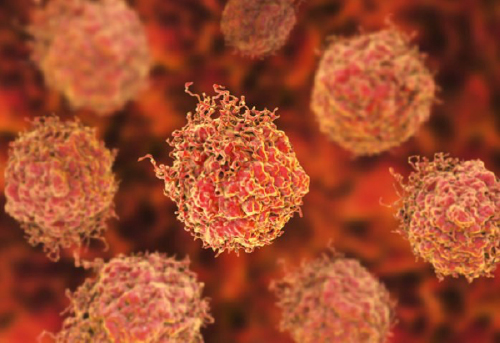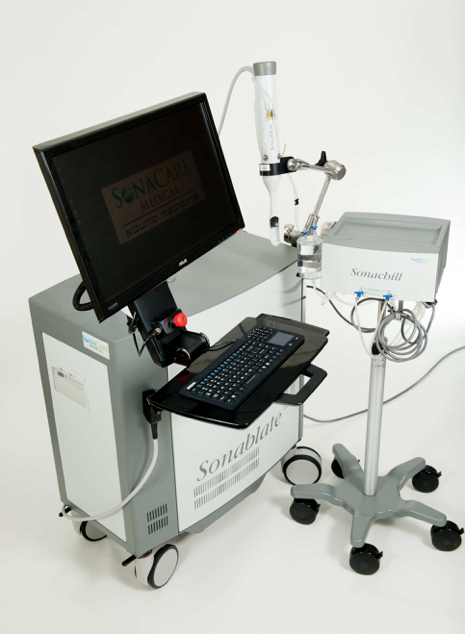Prostate cancer: HIFU ultrasound treatment as effective as surgery or radiotherapy
Source: doi.org Jul 10, 2018 6 years, 9 months, 2 weeks, 3 days, 17 hours, 47 minutes ago
Using high energy ultrasound beams to destroy prostate cancer tumours may be as effective as surgery or radiotherapy, but with fewer side effects.
Ultrasound therapy destroys cancer cells in the prostate (illustrated)
Prostate cancer is the most common cancer in men in the UK, with around 47,000 cases every year. Treatments include surgery to remove the gland, or radiotherapy, which uses radiation to the entire prostate.
However, these treatments can cause collateral damage to surrounding sensitive tissues like nerves, muscles, urine passage, bladder, and rectum. The prostate is roughly the size of a walnut and sits between the bladder and the penis.
Surgery and radiotherapy to the entire prostate are effective treatments but can lead to a long-term risk of urinary problems, like incontinence, of between 5-30 percent.
In a new study conducted at six hospitals across the UK, scientists tested 625 men with prostate cancer who received a type of treatment called high-intensity focused ultrasound (HIFU). They found that after five years the cancer survival rate from HIFU was 100 percent. Approximately, 1 in 10 men needed further treatment. The
cancer survival rate from surgery and radiotherapy is also 100 percent at five years.
HIFU treatment used to target prostate tumors. The treatment is similar to a ‘lumpectomy’ for other
cancers – where
doctors remove only tumor cells, leaving as much healthy tissue as possible.
Scientists also show that the risk of side effects of HIFU, such as urinary incontinence and erectile dysfunction, were lower than other treatment options, at 2 percent and 15 percent respectively.
Professor Hashim Ahmed, a lead author from the Department of Surgery and Cancer at
Imperial, said: “Although prostate cancer survival rates are now very good, the side effects of surgery or radiotherapy can be life-changing. Some patients are left requiring multiple incontinence pads every day, or with severe erectile dysfunction.”
The study tracked 625 men with prostate cancer who received a type of treatment called high-intensity focused ultrasound (HIFU) (pictured) . Image: SonaCare Medical LLC
He added: “We need to now focus on improving the quality of life for these men following treatment. This latest trial of focal HIFU – which is the largest and longest study of the treatment to date – suggests we may be able to tackle cancer with fewer side effects.”
During the study, researchers additionally followed the number of patients who required further treatment following
HIFU, (for example, medical procedure or radiotherapy), to treat any tumor cells that had returned. They discovered 10% of patients required further treatment by five years, which is practically identical to the number of patients requiring further treatment after medical procedure or radiotherapy.
Dr. Caroline Moore, Reader in Urology from the UCL Faculty of Medical Sciences said: “The registry-based data from over 600 men is very encouraging. We started the HIFU programme at UCLH in 2003, and now principally use it as a focal treatment, where we treat cancer but not the entire prostate.”
Anthony Murland underwent HIFU treatment in November last year at Imperial College Healthcare NHS Trust to treat his prostate cancer. He said, “I first heard of the treatment from a friend, who had the procedure a few months before. My GP hadn’t heard of HIFU but was very interested, so I ended up educating him about it. He then referred me for the treatment on the NHS.”
“I liked the sound of the treatment as it seemed the least invasive option, with low risk. The treatment was over in a day – I went in first thing in the morning and was out by the evening. I didn’t have any pain but needed a catheter for five days, which was a bit uncomfortable.”
“I’m closely monitored by my GP, and so far cancer has not returned.”
The study was published in the journal European Urology.
Reference:
https://doi.org/10.1016/j.eururo.2018.06.006

